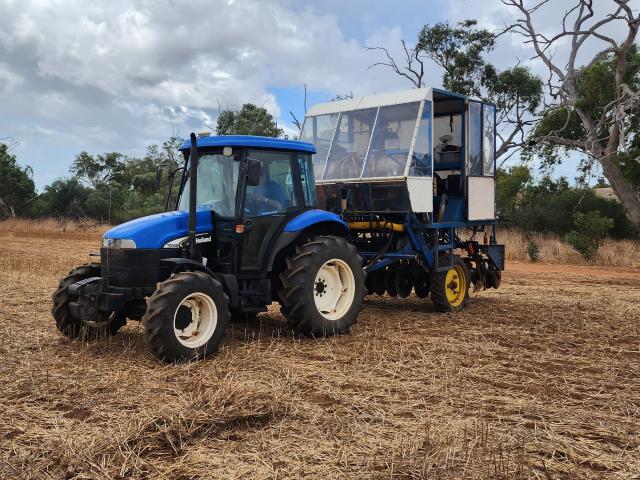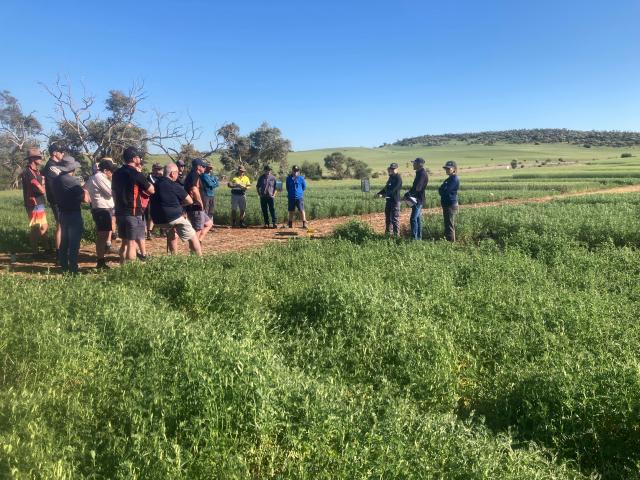Background
WA farming systems have evolved over the last 20 years with increases in both the area cropped, and yields achieved. Growers continuously adapt to strategic risks through effective management decisions and innovative production approaches. Much of the system innovation that occurs is underpinned by research and development.
Growers must continue to adapt to strategic risks such as climate change and a shift in production systems towards carbon neutrality, to remain internationally competitive, sustainable, profitable and build the climate resilience of their production systems.
Using a multi-disciplinary farming systems research approach, this project will address three main farming systems considerations;
- System break options that deliver improved profit and acceptable risk.
- A thorough analysis on the opportunities and risk of changing the timing of seeding.
- Analysis of management options for maintaining profitability under low greenhouse gas (GHG) emission scenarios.
The approach will include field trials, on-farm research and monitoring, grower and industry participation, and whole farm economic and biometric modelling.
Research trial activities will be conducted at three regions representing different production environments across the WA grainbelt;
- Medium rainfall, north – led from Geraldton.
- Medium rainfall, south – led from Katanning.
- Low rainfall – led from Merredin.
Regional Innovation Groups
Stakeholders from each of the three regions have indicated a strong willingness and commitment to engage with the research team through their participation in Regional Innovation Groups. These groups will provide critical, ongoing input into prioritisation, refinement and confirmation of research questions and system trial treatments in each region and guide the further development of the research project.
Project activities
Large scale system trials
Four-year, large scale systems trials were sown at three trial sites in 2023. Each represents a different production environment across the WA grainbelt. These are:
- Medium rainfall, north – led from Geraldton with trial site located at Northampton
- Medium rainfall, south – led from Katanning with trial site located at Lake Grace
- Low rainfall - led from Merredin with trial site at the Merredin Research Station.
Trial sites use over 40 treatments to compare different rotations (including wheat, lupins, canola, pasture, vetch, serradella and fallow), sowing times (dry vs wet) and nitrogen rates.
Yield, soil nutrients, water use, weeds, disease and greenhouse gas emissions will be measured to compare the different rotations. Results will combine with whole farm economic modelling to address the following considerations;
- Are financial risks and/or greenhouse gas emissions reduced with in WA cropping systems by reducing nitrogen inputs and diversifying rotations?
- How does water use efficiency (WUE) and nitrogen use efficiency (NUE) of cereals change relative to each other due to altered rotations, reduced fertiliser nitrogen and their interactions.
- What strategies can be used to increase profit across the rotation while managing weeds, diseases, soil fertility and risk.
Results from 2023 have been published in the WAFS Field Trails report 2023 located in the documents section.
Other trials
The project will look to complement its long term trials with relevant trials in the region. In 2024 these will include:
- Time of sowing by species – Geraldton, Chapman Valley, Merredin, Lake Grace
- Pulse, Safflower and Chickpea legacy – Ogilvie, Merredin
- Vetch end use - Sandy Gully, Merredin, Lake Grace, Wittenoom Hills
Modelling and analysis will play an important role in extrapolating the findings of the trials to a greater number of locations, soil types, treatments and long term climate records.
Extension activities
Research papers and media articles from the project can be found below:
2024
- Crop and Pasture Science article - Should crop sequences in Western Australia include more lupins?
- Crop and Pasture Science article - Profitable, low emission nitrogen application strategies in Western Australian dryland cropping
- Grains Convo article - DPIRD research addresses trade-off between emissions and profitability
2023
- Grains Research Update Paper 2023 - Improving farming systems profitability, management of greenhouse gas emissions and climate resilience in the low and medium rainfall zones of WA: Grower Perspectives.
2022
- GRDC groundcover article, Sept/Oct 2022 - New Farming Systems project for WA Grain Growers
Acknowledgments
The WA Farming Systems project is a 5 year co-investment by the Department of Primary Industries and Regional Development (DPIRD) and the Grains Research and Development Corporation (GRDC).




